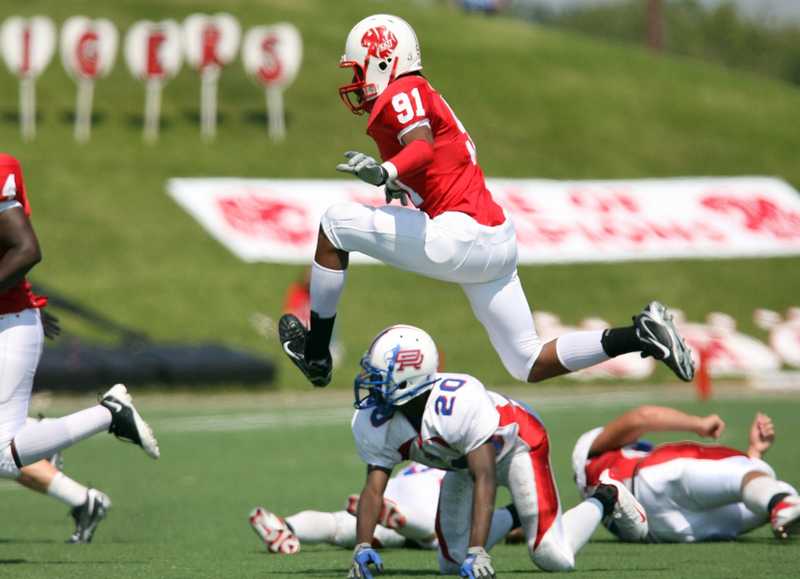Imagine working your entire life towards your dream, only to have it snatched away because of an outdated policy. This is exactly what’s happening to C.J. Harris, a talented high school football player who was recruited to play college football at Auburn.
Harris thought his football dreams had come true, but then he got the terrible news: He could only play football if he stopped taking his medication—the cannabidiol (CBD) oil that controls his seizures.
FOLLOW US ON FACEBOOK & INSTAGRAM
C.J.’s Story of Seizures & How CBD Helps
C.J. has been battling seizures since the eighth grade. By sophomore year of high school, the problem had escalated to two to three seizures per month.
Looking for a workable treatment, C.J. tried out a variety of pharmaceutical options. Unfortunately, like 30–40% of those with seizures, the traditional anti-seizure medications were ineffective for him. That’s when doctors decided to put him on an alternative treatment that had shown promising results for others: CBD.
CBD is a cannabinoid, or chemical, derived from the cannabis plant known for its ability to calm and even prevent seizures.
RELATED: EPILEPSY RELIEF POSSIBLE THROUGH MEDICAL CANNABIS
The results were incredible. Since starting the CBD oil in January 2017, Harris hasn’t had a single seizure. With his condition completely under control, Harris went on to lead his high school football team to the state championship game.
C.J.’s performance caught the eye of recruiters from Auburn, who offered him a spot on its team; it’s one of the top college football programs in the country.
It was a dream come true for C.J., but soon he received some crushing news. The National Collegiate Athletic Association (NCAA) reviewed his medical files, and they wouldn’t let C.J. play while he had CBD in his system. As a cannabis-derived product, CBD is banned in college football with no exceptions.
C.J. was left with an impossible choice: Give up his football dreams or go back to having regular seizures. Of course, stopping his medication wasn’t really option, because he had no other treatment alternatives—and having dangerous seizures wouldn’t be safe.
Sadly, he remains ineligible to play, despite all of his skill, talent and hard work.
C.J. Isn’t the Only One Taking CBD for Seizures
After his story was widely reported, C.J. received a stream of supportive messages from many, including state representatives, epilepsy foundations and other athletes. They all urged the NCAA and Auburn to reconsider their decision.
Jerry Kill, who was Big Ten Coach of the Year while coaching the University of Minnesota football team, has battled seizures himself and harshly criticized the choice to ban C.J.
"That young man should not be punished for a disorder that is being controlled by cannabis oil," said Jerry. "I encourage both parties to take a good look at what they're doing to a young man's dream. … A kid should not be punished for his seizures being brought under control. It's not fair to the kid."
C.J. isn’t the only one taking CBD for seizures. CBD has been shown to be a safe and effective option. Studies show that taking CBD can lead to a vast improvement in seizure disorders—reducing the frequency of seizures or even stopping them completely.
CBD is legal for medical use in many states, with hemp-derived CBD available nationwide. It’s non-psychoactive, non-addictive and without any known negative side effects according to the World Health Organization.
Even the pharmaceutical industry seems to be giving CBD its stamp of approval. Pharma giant GW Pharmaceuticals recently developed a CBD-based medicine for epilepsy called Epidiolex. Epidiolex even made it through FDA approval.
Yet, despite these developments, CBD continues to be banned for athletes.
A Call to Ease the Ban on Cannabis for Athletes
C.J.’s story has made more people think about why most sports leagues continue to ban cannabis. From managing pre-existing health conditions to treating the side effects of sports-related injuries such as concussions and chronic pain, cannabis has shown promising results. But in the U.S., almost all sports organizations ban cannabis, even isolated forms of non-psychoactive CBD.
Now athletes from many different sports are advocating for access to this life-altering—and sometimes life-saving—medicine. From former pro-football stars like Ricky Williams and Jake Plumber to former NBA players like Cliff Robinson to pro mixed-martial artists like Nick Diaz, many are calling for sports leagues to reconsider their cannabis bans.
Of course, there are a few notable exceptions to the blanket ban on cannabis in American sports. The NHL doesn’t mention cannabis on its list of banned substances at all. And some former NHL players like Riley Cote have been vocal about their own cannabis use for hockey-related injuries and pain.
The World Anti-Doping Association (WADA), the organization that regulates which substances are allowed in the Olympics, recently changed its rules on CBD. While all other cannabis is still banned, WADA made an exception for CBD—adding it to the list of acceptable treatments.
WADA usually sets the international standards for what’s allowed in sports, with many organizations taking on these standards themselves. But with the exception of a new minor league basketball organization, the North American Premier Basketball League (NAPB), few in the U.S. have followed suit.
Hopefully, as public support for cannabis and CBD continues to grow, we’ll start to see more changes in these policies. Our athletes go through so much physical hardship for our entertainment. The least we can do is allow those who rely on CBD, like C.J. Harris, to continue to use the medicine that keeps them healthy.
Photo credit: Pixabay
If you’re new to cannabis and want to learn more, take a look at our Cannabis 101 index of articles. HelloMD can help you get your medical marijuana recommendation; it's 100% online, private and efficient.
